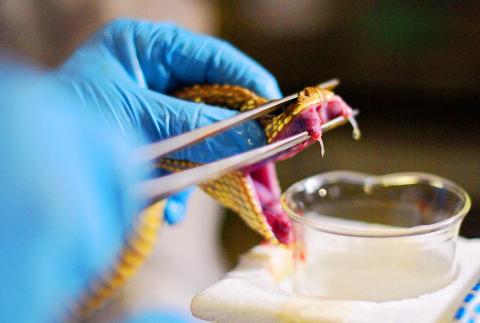Gripping the deadly snake behind its jaws, Fabiola de Souza massaged its venom glands to squeeze out drops that would save lives across Brazil, where thousands of people are bitten every year.
De Souza and her colleagues at the Instituto Butantan in Sao Paulo harvest the toxin from hundreds of snakes kept in captivity to produce antivenom, which is distributed by the Brazilian Ministry of Health to medical facilities nationwide.
Dozens of poisonous snake species, including the jararaca, thrive in Brazil’s hot and humid climate.

Photo: AFP
Nearly 29,000 people were bitten last year and more than 100 died, official figures showed.
States with the highest rates of snakebite were in the vast and remote Amazon basin, where it can take hours to reach a hospital stocked with antivenom.
Venom is extracted from each snake once a month in a delicate and potentially dangerous process.
Using a hooked stick, De Souza carefully lifted one of the slithering creatures out of its plastic box and maneuvered it into a drum of carbon dioxide. Within minutes, the reptile was asleep.
“It’s less stress for the animal,” De Souza said.
The snake was then placed on a stainless steel bench in the room, where the temperature hovers at about 27°C. De Souza had a few minutes to safely extract the venom before the snake began to stir.
“It’s important to have fear, because when people have fear they are careful,” she said.
The snakes are fed a diet of rats and mice that are raised at the leafy institute and killed before being served up once a month.
After milking the snake, De Souza recorded its weight and length before placing it back in its container.
The antivenom is made by injecting small amounts of the poison into horses — kept by Butantan on a farm — to trigger an immune response that produces toxin-attacking antibodies.
Blood is later extracted from the hoofed animals and the antibodies harvested to create a serum that can be administered to snakebite victims, who might otherwise die.
Butantan project manager Fan Hui-wen said that the institute makes all of the country’s antivenom — about 250,000 10ml to 15ml vials per year.
Brazil also donates small quantities of antivenom to several countries in Latin America. There are now plans to sell the life-saving serum abroad to help relieve a global shortage, particularly in Africa.
About 5.4 million people are estimated to be bitten by snakes every year, WHO data showed.
Between 81,000 and 138,000 die, while many more suffer amputations and other permanent disabilities as a result of the toxin.
To cut the number of deaths and injuries, the WHO earlier this year unveiled a plan that includes boosting production of quality antivenoms.
Brazil is part of the strategy. It could begin to export antivenom as early as next year, Fan said.
“There is interest for Butantan to also supply other countries due to the global crisis of antivenom production,” she said.

IDENTITY: A sex extortion scandal involving Thai monks has deeply shaken public trust in the clergy, with 11 monks implicated in financial misconduct Reverence for the saffron-robed Buddhist monkhood is deeply woven into Thai society, but a sex extortion scandal has besmirched the clergy and left the devout questioning their faith. Thai police this week arrested a woman accused of bedding at least 11 monks in breach of their vows of celibacy, before blackmailing them with thousands of secretly taken photos of their trysts. The monks are said to have paid nearly US$12 million, funneled out of their monasteries, funded by donations from laypeople hoping to increase their merit and prospects for reincarnation. The scandal provoked outrage over hypocrisy in the monkhood, concern that their status

The United States Federal Communications Commission said on Wednesday it plans to adopt rules to bar companies from connecting undersea submarine communication cables to the US that include Chinese technology or equipment. “We have seen submarine cable infrastructure threatened in recent years by foreign adversaries, like China,” FCC Chair Brendan Carr said in a statement. “We are therefore taking action here to guard our submarine cables against foreign adversary ownership, and access as well as cyber and physical threats.” The United States has for years expressed concerns about China’s role in handling network traffic and the potential for espionage. The U.S. has

A disillusioned Japanese electorate feeling the economic pinch goes to the polls today, as a right-wing party promoting a “Japanese first” agenda gains popularity, with fears over foreigners becoming a major election issue. Birthed on YouTube during the COVID-19 pandemic, spreading conspiracy theories about vaccinations and a cabal of global elites, the Sanseito Party has widened its appeal ahead of today’s upper house vote — railing against immigration and dragging rhetoric that was once confined to Japan’s political fringes into the mainstream. Polls show the party might only secure 10 to 15 of the 125 seats up for grabs, but it is

Trinidad and Tobago declared a new state of emergency on Friday after authorities accused a criminal network operating in prisons across the country of plotting to kill key government officials and attack public institutions. It is the second state of emergency to be declared in the twin-island republic in a matter of months. In December last year, authorities took similar action, citing concerns about gang violence. That state of emergency lasted until mid-April. Police said that smuggled cellphones enabled those involved in the plot to exchange encrypted messages. Months of intelligence gathering led investigators to believe the targets included senior police officers,